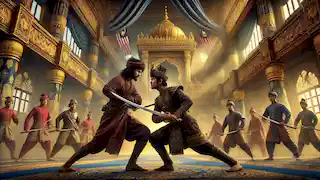Introduction
In the annals of Malay history, one figure stands tall as a symbol of loyalty, bravery, and martial prowess: Hang Tuah. His name is synonymous with the golden age of the Malacca Sultanate, a maritime empire that reigned over the Malay Peninsula and surrounding regions in the 15th century. Legends of Hang Tuah have been passed down through generations, blending history, folklore, and mythology. His story is one of friendship, betrayal, loyalty, and duty, encapsulating the virtues revered by Malay culture. Through his adventures and struggles, Hang Tuah has earned a permanent place in the hearts and minds of Malaysians, embodying the spirit of unwavering dedication to one's king and country.
The Rise of Hang Tuah
Hang Tuah was born in a small fishing village called Kampung Sungai Duyung, situated on the southern coast of Malacca. His early life was marked by poverty and hardship, but even as a young boy, he exhibited exceptional intelligence, bravery, and a thirst for adventure. The village elders often spoke of his unusual strength and the mysterious aura that seemed to surround him.
One day, a group of marauding pirates attacked the village, wreaking havoc and terror. Young Tuah, though barely of age, rallied the villagers, displaying his innate leadership and courage. With only basic weapons, he fought the pirates valiantly, driving them back into the sea. His remarkable feat caught the attention of the Sultan's chief minister, Bendahara Tun Perak, who was visiting the region at the time.
Impressed by the boy's bravery, Tun Perak brought Tuah to the royal court of Malacca, where he was introduced to Sultan Mansur Shah. The Sultan, recognizing Tuah's potential, decided to take him under his wing and train him in the arts of combat, diplomacy, and statecraft. Along with four other boys—Hang Jebat, Hang Kasturi, Hang Lekir, and Hang Lekiu—Tuah was schooled in the highest traditions of Malay martial arts and silat, an ancient form of combat.
These five boys grew up together, forming a brotherhood bound by loyalty, friendship, and a shared sense of duty to the Sultan and the Malacca Sultanate.

The Sultan’s Trusted Warrior
As the boys matured, it became clear that Hang Tuah was the most skilled among them. His mastery of silat, combined with his sharp intellect and unyielding loyalty, earned him the Sultan's favor. Tuah became the Sultan’s most trusted warrior and was soon elevated to the rank of Laksamana, or Admiral, of the Malacca fleet. This position was one of great responsibility, as the Malacca Sultanate controlled the vital maritime trade routes that connected the East and the West.
Under Tuah's command, the Malacca fleet became a formidable force, feared by pirates and respected by neighboring kingdoms. He was known for his diplomatic skills as well, often serving as the Sultan's envoy on critical missions to foreign courts. Tuah's reputation as an indomitable warrior and a skilled negotiator spread far and wide, enhancing the prestige of the Malacca Sultanate.
Despite his rise to prominence, Hang Tuah remained humble and devoted to his childhood friends. Together, they continued to serve the Sultan and the people of Malacca, bound by a brotherhood that seemed unbreakable.
However, the winds of fate would soon test this brotherhood, and the bonds of friendship would be strained to their limits.
The Betrayal of Hang Jebat
Trouble began to brew in the royal court of Malacca. A series of political intrigues and jealousies began to swirl around the Sultan's favor for Hang Tuah. Court officials who envied Tuah’s influence over the Sultan conspired to bring him down. Their opportunity came when Hang Tuah was falsely accused of having an affair with one of the Sultan's concubines. The accusation shocked the royal court, and without waiting for a proper investigation, the Sultan ordered Hang Tuah's execution.
Bendahara Tun Perak, who had always been a father figure to Tuah, could not bear to see the young warrior die unjustly. Instead of carrying out the Sultan's order, Tun Perak secretly hid Hang Tuah in a remote village, telling the Sultan that Tuah had been executed as commanded.
Upon hearing the news of his friend's death, Hang Jebat, one of Tuah’s closest companions, was consumed by grief and anger. Believing that the Sultan had wrongfully killed his loyal friend, Jebat swore vengeance. In an unprecedented act of rebellion, Jebat seized the royal palace and declared himself the ruler of Malacca. His defiance against the Sultan shocked the court and the people of Malacca, as loyalty to the ruler was a cornerstone of Malay culture.
Jebat's rebellion was not born out of ambition for power but from a sense of justice for Hang Tuah. However, in his quest for revenge, Jebat's actions grew increasingly violent, and the once noble warrior became a symbol of chaos and disorder.

The Return of Hang Tuah
The Sultan, now desperate to regain control of his kingdom, regretted his hasty decision to order Tuah's death. In his despair, the Sultan confided in Bendahara Tun Perak, expressing his wish that Tuah were still alive to help restore order. It was then that Tun Perak revealed the truth: Hang Tuah was not dead but had been hiding in secret, awaiting the Sultan's call.
Overjoyed by the news, the Sultan immediately summoned Tuah back to the court. Tuah, ever loyal to his ruler, returned without hesitation, despite the injustice that had been done to him. The Sultan, humbled by Tuah’s loyalty, ordered him to confront Jebat and restore peace to the kingdom.
Tuah's heart was heavy as he prepared for the battle. Jebat was not only his comrade but his closest friend, and the thought of fighting him filled Tuah with sorrow. Nevertheless, Tuah was bound by his duty to the Sultan and the laws of loyalty that governed Malay society. With great reluctance, he took up his kris—a traditional Malay dagger—and confronted Jebat in the royal palace.
The ensuing battle was one of the most legendary duels in Malay history. For days, Tuah and Jebat fought, their skills and strength evenly matched. The palace became their battleground, and as they clashed, both warriors displayed their unmatched mastery of silat.
In the end, it was Tuah who emerged victorious, though the victory was bittersweet. With his dying breath, Jebat forgave Tuah, expressing his understanding of why Tuah had to uphold his duty, even at the cost of their friendship. Tuah, heartbroken, held his friend in his arms as life ebbed from Jebat’s body.
The death of Hang Jebat marked the end of the rebellion, and peace was restored to the kingdom, but it came at a great personal cost to Hang Tuah. His loyalty to the Sultan had been proven beyond doubt, but it had also cost him the life of his dearest friend.

The Final Days of Hang Tuah
In the years that followed, Hang Tuah continued to serve the Sultan of Malacca with unwavering dedication. He led many successful diplomatic missions, forged alliances with foreign powers, and defended the kingdom from external threats. His legend grew, and his name became synonymous with loyalty, honor, and bravery.
Yet, despite his many achievements, Tuah remained haunted by the loss of Jebat. The bond they had shared was irreplaceable, and the memory of their final duel lingered in Tuah’s heart. He often withdrew from the court, spending more time in quiet contemplation.
As the Malacca Sultanate faced increasing pressure from foreign powers, particularly the Portuguese, Tuah realized that the golden age of his beloved kingdom was coming to an end. Despite his best efforts, he could not prevent the eventual decline of Malacca.
In his final days, Hang Tuah disappeared from the court, leaving behind no trace of his whereabouts. Some say he retired to a remote village, living out the rest of his life in solitude. Others believe that he embarked on one last journey, sailing across the seas in search of peace. To this day, the exact details of his death remain a mystery.
However, Hang Tuah's legacy endures in the hearts of the Malay people. His life, filled with loyalty, sacrifice, and bravery, serves as a timeless reminder of the virtues that define the Malay identity.
Conclusion
The legend of Hang Tuah is more than just a story of a warrior; it is a reflection of the values that underpin Malay culture—loyalty, honor, and the importance of duty. Through his trials and tribulations, Hang Tuah remained steadfast in his commitment to his Sultan and his country, even when it meant making the ultimate sacrifice. His story continues to inspire generations, not only in Malaysia but throughout the Malay world.
Hang Tuah's legend lives on, not just in the pages of history but in the hearts of those who continue to honor his memory.
{{{_04}}}


















